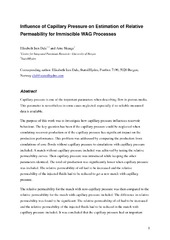Influence of Capillary Pressure on Estimation of Relative Permeability for Immiscible WAG Processes
Journal article
Draft

Åpne
Permanent lenke
https://hdl.handle.net/1956/5264Utgivelsesdato
2008-04-30Metadata
Vis full innførselSamlinger
Sammendrag
Capillary pressure is one of the important parameters when describing flow in porous media. This parameter is nevertheless in some cases neglected, especially if no reliable measured data is available. The purpose of this work was to investigate how capillary pressure influences reservoir behaviour. The key question has been if the capillary pressure could be neglected when simulating reservoir production or if the capillary pressure has significant impact on the production performance. This problem was addressed by comparing the production from simulations of core floods without capillary pressure to simulations with capillary pressure included. A match without capillary pressure included was achieved by tuning the relative permeability curves. Then capillary pressure was introduced while keeping the other parameters identical. The total oil production was significantly lower when capillary pressure was included. The relative permeability of oil had to be increased and the relative permeability of the injected fluids had to be reduced to get a new match with capillary pressure. The relative permeability for the match with zero capillary pressure was then compared to the relative permeability for the match with capillary pressure included. The difference in relative permeability was found to be significant. The relative permeability of oil had to be increased and the relative permeability of the injected fluids had to be reduced in the match with capillary pressure included. It was concluded that the capillary pressure had an important 2 impact on production behaviour and therefore also on history matching of relative permeability. If capillary pressure is not included the relative permeability of oil will be underestimated and the relative permeability of the injected fluids, gas and water, will be overestimated.